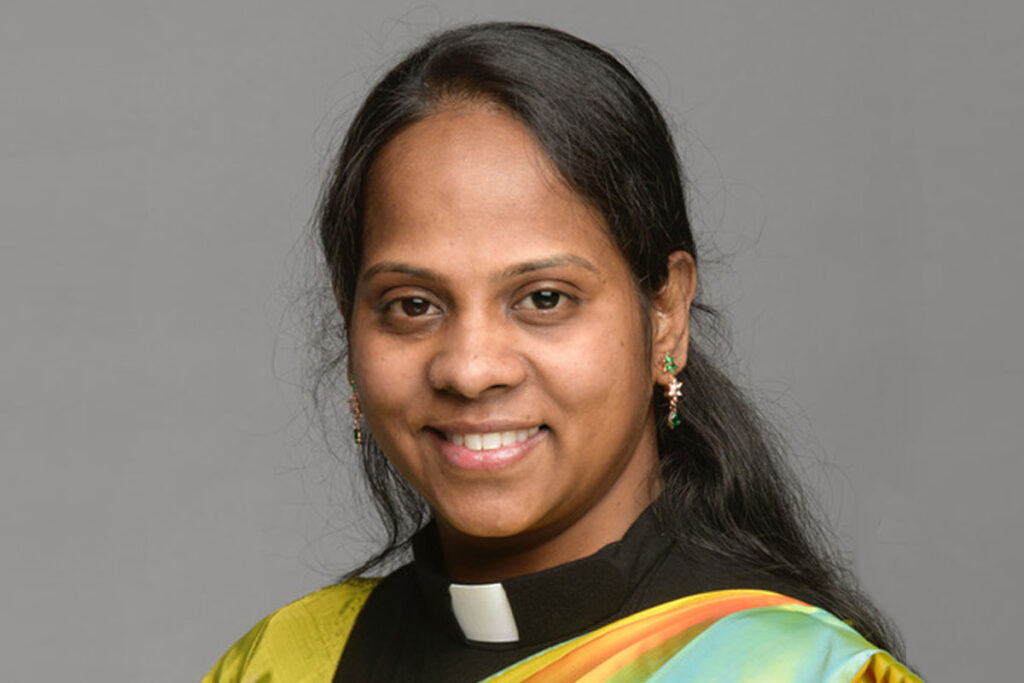PhD Student Helen Chukka on the Path from India to LSTC and Beyond

For PhD student and Pastor Helen Chukka, a life in pastoral work was never in question. Before her birth, her parents in Guntur, India, dedicated her to ministry. “It was like Jeremiah’s call,” she explains, “And this is normal in an Indian context, although it is mostly men who are dedicated.” For Chukka, however, the dedication resonated with her spirit. “From a very young age I would say, ‘I am Sweety Helen, Pastor Ji,’” Chukka recalls, smiling at her young self and her use of the gender-neutral Hindi honorific suffix commonly indicated to show respect for an elder or person of prominence.
Chukka’s journey to a PhD at LSTC and her work on the Hebrew Bible and what we can learn from Ezra 9 and 10 regarding mixed marriages and power dynamics started in India. The topic came from an unexpected place: Chukka was studying towards her Bachelor’s in Divinity and her Master’s in Theology at Gurukul Lutheran Theological College and Research Institute when a colleague indicated that if she revealed her status as a Dalit woman that she would be more likely to get a scholarship. The suggestion came as a shock. Chukka was aware of the negative connotations associated with the category. As James Massey, a Dalit theologian asserts, “the term Dalit is a self-ascribed Marathi term that depicts the social condition of Dalits. It means ‘oppressed,’ ‘broken’ or ‘crushed,’ like dal or lentil is crushed with a heavy pestle,” Chukka explains. “I wasn’t ready to accept that I was one among those.”
She called her father, a trusted resource, and asked “Who is a Dalit?” Her dad promptly responded, “you and me.” It was a moment that proved to be transformative for Chukka’s scholarship, academic trajectory, and future in ministry. “That was the beginning of my journey towards understanding what caste is,” Chukka says. “And I would say, if we need to talk about India and power dynamics that exist in an Indian context, we need to talk about caste. Just how race is understood in an American context, caste is a prism through which we understand the Indian context.”
In embracing the identity of a Dalit woman, Chukka found the strength and power to challenge the otherization and discrimination that has for centuries resulted in economic, social, and even bodily harm to members of Dalit communities. This is especially true for those people who engage in a phenomenon known as “inter-caste marriages,” or building family ties, as Chukka has in her own life, between castes and cultures. As Indian jurist, economics, social reformer, and political leader Bhimrao Ramji Ambedkar says, the only way we can eliminate caste is to engage in mixed marriages. When you engage in mixed marriages, caste slowly weakens.
While attending Union Theological Seminary for her Master of Sacred Theology (STM) as an ordained minister in the Andhra Evangelical Lutheran Church, Chukka began to seriously consider how a PhD might help her achieve her dreams of teaching theology in the future. It seemed to be a pathway that would support her interests as an intellectual and an advocate and allow her the space to continue the commentary, writing, and intellectual labor that had become important to her in her ministry. The question was: where to attend?
“The reason that I applied to LSTC is that LSTC has produced many scholars for India, and Dr. Monica Melanchthon, an alumnus of LSTC, is my mentor,” Chukka says. “Along with another scholar, Dr. George Zachariah, who is also alumnus and mentor.” Upon getting accepted to LSTC with a full tuition scholarship, Chukka knew that her dreams were fast becoming reality. Even better, attending LSTC came with opportunities ripe for connection, difference-making, and intellectual advancement.
For Chukka, events put on by the Language, Resource, and Writing Center (LRWC), including the 2017 Summer Institute, helped her feel accepted into the LSTC community. “We met people from different social locations, different geographical backgrounds,” Chukka remembers. “And I didn’t feel that I was out of place. I just felt welcomed, because of the LRWC.” Chukka also immersed herself in the work of the institution’s Worship Team as one of the assistants to the Director of Worship under Pastor Erik Christensen. “We have diverse students on our staff,” Chukka says. “And I’ve been on the worship team for the past six years.”
To other prospective students considering LSTC, Chukka wishes to provide encouragement. Though she is graduating in the spring of 2023, she looks forward to more students with backgrounds like her own taking this important step in their faith and leadership journeys. For Chukka, who has dedicated herself to this work for years, the benefits are manifold—and are only just beginning.